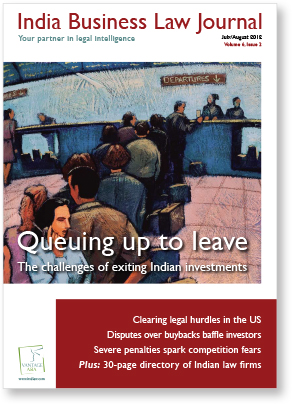Despite changes at the Finance Ministry, regaining confidence will remain a challenge
Consistency and certainty – essential ingredients for a conducive investment atmosphere – have taken a severe knocking and while a change of guard is valuable, concrete action will be key to boosting confidence.
The new finance minister has spoken of “removing apprehensions or distrust” from the minds of investors and the need for “carefully calibrated risks” to stimulate investments. But investors, who are unsure about their prospects in India, may be at the end of their tether. Will the political realities of India’s coalition government allow appropriate action to follow the rhetoric?
International investors appear to be reconsidering their positions in India after waiting in vain for change to happen. Some that were exploring new transactions have put their plans on hold. Others are rolling back their operations to cut losses while they still can.

In Tug of war, we highlight how conflicting views on the buyback of shares – a commonly used exit method – continue to baffle investors. Implementing a buyback can lead to legal challenges and our feature identifies the issues faced by an unlisted company.
The lack of certainty in India coupled with an abundance of opportunity overseas has prompted Indian companies to invest abroad. In Prosper or perish? , we focus on Indian investment in the US, which has recently been the third most-favoured destination for Indian companies after Mauritius and Singapore.
Investing in what is still the world’s largest economy presents an array of problems, partly because stakeholders within the US can be very concerned about investment from overseas. Robert DeLaMater, a partner at Sullivan & Cromwell, points out that “you need to [explain] what you plan to do with the business in the future”. Our coverage also includes an analysis of the recently passed US Jumpstart Our Business Startups (JOBS) Act, which reduces the regulatory burden on small and medium-sized companies that choose to go public in the US.
Meanwhile, companies in India are coming to terms with functioning under an increasingly stringent antitrust regime. It is now more than a year since all sections of the Competition Act, 2002, have been in force and orders passed by the Competition Commission of India (CCI) have been making headlines on account of both their severity and the speed with which action has been taken. Falling foul of competition laws can prove costly to both the reputation and the bottom line of a company.
As we detail in Playing by the rules, it is vital for companies to have a compliance programme in place. Not only is it an effective preventive measure, but in case of any violation the CCI may take proactive action by a company on this front as a sign that it is eager to comply with competition law.
Our coverage analyses what an effective compliance programme comprises and suggests other measures that a company should consider putting in place – useful information for companies everywhere.
However, staying abreast of regulatory developments is just one of the many challenges of operating in India. Dwindling foreign investments, policy paralysis and now an impending drought are all taking their toll on the economy.
It is against this backdrop that India Business Law Journal presents its fifth annual Directory of Indian Law Firms. As in previous years, the directory is accompanied by incisive editorial analysis of the state of play in India’s legal market. As we outline, legal advisers are much in demand in these turbulent times. Mohit Saraf at Luthra & Luthra remarks these are “very very difficult and tough times” but one “where we have seen that people are willing to pay top dollar for highest quality service”. Clearly, a challenging market but one where the best can prosper.
As India’s lawyers up their game and as India Inc expands overseas there will be little to stop law firms from extending their reach beyond India. Writing in Vantage point, Stephen Kines, a law firm development specialist, suggests that when Indian firms take the initiative and do so: “What is often seen as India’s weakness – the steadfast adherence to the old-school style of the loyal and trustworthy sole practitioner rather than the business shark – may prove to be its strength.”
Kines thinks that an “over-commercialization of the legal profession” in more developed jurisdictions has led clients to lose faith. He says Indian law firms “have the means and ambition to dictate the growth of their legal service offerings globally, and be a part of a new world order – one that they can lead”.
Thought-provoking sentiments that will no doubt resonate through the ranks of the legal community.



























